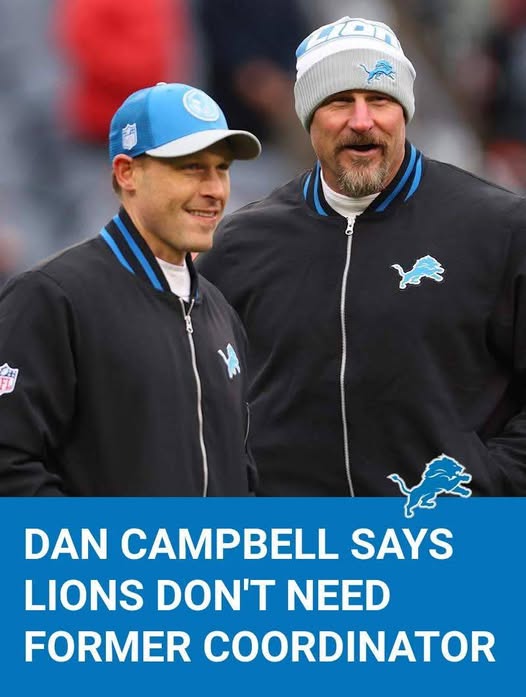Dan Campbell Says Lions Don’t Need Former Coordinator: The Future of the Detroit Lions Under New Leadership
The Detroit Lions have been a team in transition for years. The perennial underdog of the NFC North, the Lions have long struggled to gain consistency and competitiveness. From the legendary days of Barry Sanders to the brief flashes of hope under Calvin Johnson, the franchise has always been one step away from truly breaking through to the elite level of the NFL.
However, recent developments in Detroit suggest that the team may be on the cusp of a new era of success. Under head coach Dan Campbell, the Lions have shown a renewed sense of energy, toughness, and resilience. Campbell, known for his no-nonsense attitude and intense focus on building a strong team culture, has quickly become a favorite in Detroit, earning the respect of players, coaches, and fans alike.
One of the most recent and notable statements from Campbell has garnered attention around the league: his assertion that the Lions no longer need their former offensive coordinator, Ben Johnson. The news was surprising, given that Johnson had been a rising star in the coaching ranks, with many predicting him to be a future head coach in the NFL.
This bold declaration by Campbell speaks volumes about the direction of the Lions. It also raises questions about the future of the franchise and what Campbell truly believes the Lions need to succeed moving forward. In this article, we’ll take a deeper dive into Campbell’s comments, examine the impact of losing Johnson, and explore the broader implications for the Lions as they attempt to build a sustainable and successful future.
Dan Campbell’s Leadership Philosophy
Before delving into the specifics of Campbell’s statement, it’s essential to understand his approach to coaching and leadership. Dan Campbell has been nothing short of a breath of fresh air for the Detroit Lions. After taking over as head coach in 2021, Campbell quickly made it clear that he wasn’t interested in simply being another figurehead at the helm of the team. He wanted to build something different—something that would outlast any single individual, coach, or player.
Campbell’s philosophy centers around building a strong, unified team with a foundation of hard work, physicality, and mental toughness. He has emphasized the importance of establishing an identity rooted in discipline and accountability. Under his leadership, the Lions have begun to embrace a blue-collar mentality that resonates with the city of Detroit.
Campbell’s tenure has been marked by moments of progress, even if the wins have been sporadic. His willingness to take risks, including aggressive play-calling and unconventional decisions, has captured the attention of fans and analysts alike. While the Lions may not have reached the playoffs yet under Campbell, they’ve shown flashes of a team that could soon be a contender in the NFC North.
The decision to part ways with Ben Johnson, or at least to downplay his importance to the team, is consistent with Campbell’s overall strategy. He wants to build a team that’s not dependent on any single individual. This could be Campbell’s way of emphasizing that, while Johnson was an important figure, the Lions’ success ultimately hinges on the collective efforts of the entire organization.
The Rise of Ben Johnson
Ben Johnson’s rise through the ranks of NFL coaching has been nothing short of meteoric. Joining the Lions in 2021 as the team’s offensive coordinator, Johnson quickly garnered a reputation for his creative play-calling and innovative offensive schemes. Under Johnson’s leadership, the Lions’ offense began to take on a more dynamic and unpredictable character. The team showed flashes of brilliance, particularly in the passing game, where quarterback Jared Goff and wide receiver Amon-Ra St. Brown developed a strong rapport.
In 2022, the Lions’ offense took a significant leap forward, finishing in the top half of the league in both points scored and total yardage. The team’s offensive identity began to emerge, with a mix of fast-paced passing plays, creative screen designs, and a strong running game led by the talented duo of Jamaal Williams and D’Andre Swift.
Johnson’s work was praised by many, and it didn’t take long for his name to surface in head coaching discussions. It seemed as though the Lions had found a young, brilliant mind who could lead their offense for years to come. However, Campbell’s recent comments suggest that he feels the Lions have outgrown Johnson’s influence, or at least that the offense no longer needs a coordinator to succeed.
The Impact of Ben Johnson’s Departure
While Campbell’s statement may sound bold, it’s important to consider the broader context of the Lions’ current situation. Losing Johnson could have significant ramifications for the team’s offensive strategy and overall success. After all, the offense has been one of the few bright spots for Detroit in recent seasons. Johnson’s departure could leave a sizable void that would be difficult to fill.
However, Campbell’s confidence in his system and his players may suggest that he believes the Lions’ success is not entirely reliant on any one individual. The team has some young, talented playmakers, including Goff at quarterback, St. Brown at wide receiver, and rookie Jameer Gibbs at running back, who can carry the offense forward even without Johnson’s guidance.
Moreover, Campbell’s decision could be an indication of his faith in the coaching staff he’s assembled. The Lions have a number of experienced and capable assistants who could help continue Johnson’s work without missing a beat. Quarterbacks coach Mark Brunell and offensive line coach Hank Fraley have both earned respect within the coaching community and could step up to help lead the offense in new directions.
Building a Team Culture, Not Just an Offense
One of the key tenets of Campbell’s leadership is the idea of building a cohesive and resilient team culture. He has repeatedly emphasized that the Lions’ success won’t be based on just one player or one coach, but on the collective effort of everyone involved. This includes players, coaches, front-office personnel, and even the fans. Campbell believes in the idea that a team is greater than the sum of its parts, and that success will come from unity and shared purpose.
Part of Campbell’s reasoning for distancing the team from Ben Johnson may stem from his desire to shift the focus away from individual contributors and place it squarely on the team as a whole. While Johnson played a key role in the team’s offensive resurgence, Campbell wants to ensure that the Lions’ identity remains centered around hard work, accountability, and execution—not the talents of any single coach.
Furthermore, Campbell is likely aware that building a sustainable culture takes time. The Lions can’t afford to be overly reliant on one coach or one system. By creating a more flexible and adaptable framework, Campbell is ensuring that the team can weather any changes, whether they come in the form of coaching turnover or player transitions.
The Future of the Detroit Lions
As the 2023 season progresses, the Lions will continue to evolve and adapt under Campbell’s leadership. The decision to downplay the importance of Ben Johnson signals a shift in the team’s mindset—one that is more focused on the collective and less dependent on any one individual.
With a solid foundation in place, the Lions will look to build on their successes and continue their upward trajectory. The team’s offense may experience some growing pains in the short term, but with the talent on the roster and the leadership of Campbell, there’s plenty of reason to believe that Detroit is on the brink of something special.
Campbell’s long-term vision for the Lions is clear: create a team that can succeed regardless of external factors, whether it’s the departure of a key player or coach, or the inevitable ups and downs of an NFL season. In this sense, his comments about not needing Ben Johnson are a reflection of his overarching philosophy, one that prioritizes team cohesion and adaptability above all else.
The future of the Detroit Lions may no longer be tied to the presence of any one individual, but rather to the strength and resilience of the team as a whole. With Campbell at the helm, the Lions may finally be on the path to sustained success, and the days of being the NFL’s underdog may soon be behind them.



